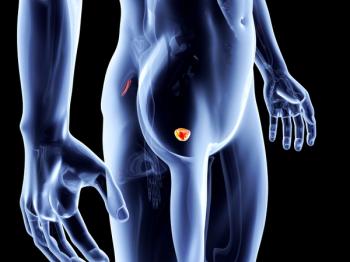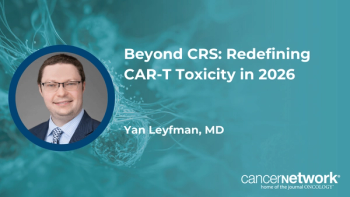
FDA Grants Breakthrough Therapy Designation to Bemarituzumab for Frontline FGFR2b+ Gastric/GEJ Cancers
Based on positive results of the phase 2 FIGHT trial, the FDA has granted the investigation antibody bemarituzumab plus FOLFOX6 breakthrough therapy designation for the treatment of locally advanced or metastatic gastric and gastroesophageal junction adenocarcinoma with FGFFR2b overexpression in the frontline setting.
The investigational, FGFFR2b-targeted antibody bemarituzumab has been granted breakthrough therapy designation by the FDA for its potential use as frontline therapy for patients with FGFFR2b-overexpressing, HER2-negative locally advanced or metastatic gastric and gastroesophageal junction (GEJ) adenocarcinoma in combination with chemotherapy, according to Amgen who is the agent’s developer.1
The use of bemarituzumab plus the chemotherapy regimen of fluoropyrimidine, leucovorin, and oxaliplatin, or FOLFOX6, will be dependent on tumors showing at least 10% of cells overexpressing FGFR2b by an FDA-approved companion diagnostic test.
Data from the global, randomized, double-blind phase 2 FIGHT trial (NCT03694522) support the decision, with positive efficacy recently reported at the 2021 Gastrointestinal Cancers Symposium.2 The designation was granted based on the subset of patients with high FGFR2b overexpression (≥10%) by immunohistochemistry (IHC).
“The FIGHT trial is the first study to evaluate targeting the overexpression of FGFR2b in cancer. Bemarituzumab demonstrated clinically meaningful outcomes in key end points for patients with advanced gastric or gastroesophageal cancer as a frontline therapy,” David M. Reese, MD, executive vice president of Research and Development at Amgen, said in a press release. “Amgen looks forward to further investigating the role of FGFR2b and will continue to work with regulatory agencies on next steps to bring this potential first-in-class, frontline therapy to patients.”
Frontline bemarituzumab plus mFOLFOX6 demonstrated a 56% reduction in the risk of disease progression or death compared with placebo and mFOLFOX6 in select patients with FGFR2b-mutant advanced gastric or GEJ adenocarcinoma (HR, 0.44; 95% CI, 0.25-0.77). The median progression-free survival (PFS) for each group was 14.1 months and 7.3 months, respectively, for patients with FGFR2b overexpression via immunohistochemistry (IHC) 2+/3+ in 10% or more of the tumor sample.
Results showed a PFS trend that favored higher FGFR2b expression, but benefit was observed in those with 5% by IHC 2+/3+ (HR, 0.54; 95% CI, 0.33-0.87) and in the intention-to-treat (ITT) population (HR, 0.68; 95% CI, 0.44-1.04; P = .0727).
Overall survival in the ITT population was not reached in the bemarituzumab arm versus 12.9 months with placebo (HR, 0.58; 95% CI, 0.35-0.95; p = .0268), with rates at 1 year of 65.3% and 56.9%, respectively.
The objective response rate with bemarituzumab was 47% versus 33% with placebo. The median time to response was 1.84 months and 1.67 months respectively. Median duration of response for the experimental regimen was 12.2 months versus 7.1 months with placebo.
Grade 3 or higher adverse events (AEs) occurred in 82.9% of patients treated with bemarituzumab/FOLFOX6 versus 74.0% of those treated with placebo/FOLFOX6; grade 5 AEs occurred in 5 and 4 patients, respectively. Of note, corneal-related events were more common in those receiving the bemarituzumab combination, with 67.1% of patients experiencing an all-grade events versus only 10.4% on placebo.
According to Zev A. Wainberg, MD, of Jonsson Comprehensive Cancer Center and presenter of the data at the symposium, these results support a prospective randomized phase 3 study in gastric/gastroesophageal adenocarcinoma.
Bemarituzumab is a first-in-class antibody that inhibits the binding of FGFs with FGFR2b, thereby blocking activation of downstream tumor signaling pathways. The agent is being explored in other tumor types with FGFR2b overexpression.
References
1. Amgen’s Investigational Targeted Treatment Bemarituzumab Granted Breakthrough Therapy Designation. News release. Amgen. April 19, 2021. Accessed April 20, 2021. https://bit.ly/3uZKQ0s
2. Wainberg ZA, Enzinge P, Kang Y, et al. A double-blind randomized study of bemarituzumab (bema) plus mFOLFOX6 versus placebo plus mFOLFOX6 as first-line treatment for advanced gastric/gastroesophageal junction cancer (FIGHT). J Clin Oncol. 2021;39(suppl):160. doi: 10.1200/JCO.2021.39.3_suppl.160
Newsletter
Stay up to date on recent advances in the multidisciplinary approach to cancer.













































